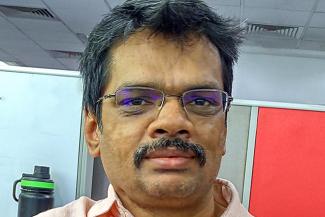
Rajiv Chandrabhanu, 43 from Bengaluru is a PwH (Person with Haemophilia) since he was 6 months old. He talks about his personal battle with the condition and how he has managed to stay afloat.
Please tell us a bit about your condition (Lesser known conditions will need to be described)
I am a person with Severe Hemophilia A (Factor VIII deficiency). Hemophilia is a rare hereditary bleeding disorder, caused by the absence of a clotting factor in the blood. I was diagnosed with Hemophilia when I was 6 months old.
What were the early symptoms?
The early symptoms were purple-blue patches all over the body. As far as we know, we have no history of hemophilia in our family.
What is your present condition? Please describe your experience of managing hemophilia.
I suffer from orthopedic issues caused by repeated bleeds into certain joints. This is a common occurrence in most PwHs (Persons with Hemophilia) of my age.
The lack of and access to treatments while growing up has led to joint disabilities and related orthopedic issues in many. I try to maintain my sense of positivity and a routine of regular exercise to ensure fewer bleeding episodes.
Some of the other complicatons I have to deal with are dental issues, neurological issues due to muscle bleeds
What were some of the challenges you faced and what is your advice to patients who face similar challenges?
Personal Challenges: As a kid, I was not allowed to play impact sports. However, that helped me to concentrate on my painting and reading. The unpredictable nature of internal/spontaneous bleeds and the severe pain associated with these bleeding episodes are difficult to explain to teachers or employers, and sometimes even to friends and acquaintances.
The cost of Anti Hemophilic Factor (AHFs) has always been very high, and therefore management was easier than treatment. Bleeds were mostly managed by cold compression and rest, and only major episodes needed intervention.
Observations and Advice: Lack of awareness was and continues to be the biggest challenge. This condition/disorder is often considered a disease and many parents wait for a “cure” or a miracle! I have come across families who have not accepted or come to terms with the condition, let alone manage it effectively.
Since women are carriers, they are often blamed by family members. There is also a certain social stigma attached to the condition.
Hemophilia can be managed effectively only when a PwH and their family understand and accept the condition to begin with.
What was the hardest part of the treatment?
The high cost of treatment has always been the hardest part. The cost of AHF continues to be extremely high, which drives up the overall cost of treatment. There is no insurance cover for hemophilia in India, which makes it even more expensive and inaccessible.
Have you learnt anything in managing in your condition that you wish you knew before?
I wish I knew that swimming was an excellent habit that I could have picked up as a kid.
Has it been difficult emotionally to cope with your condition? How do you tackle it?
Yes, frequent bleeding episodes can lead to stress/anxiety and even depression at times. Acceptance is the key. The only way to deal with a bleeding episode is rest and cold compression. Cultivating a hobby helps in relieving stress. A positive environment at home, and a loving family is a plus.
How has your family supported you?
My family has always been very supportive and my source of strength. They have endured the same or sometimes higher stress levels and depression. However, we have worked together to normalize the changes required and therefore lead a normal life as possible.
What kind of specialists do you consult and how often?
- Hematologist – once in 3 months
- Dentist – when required
- Physiotherapist – regularly
Have you had to make some changes to your lifestyle because of your condition?
Yes, I try to be careful and avoid impact activities. I cannot travel by two wheelers or crowded public transport. This has required me to use personal 4 wheelers quite early which is an expensive proposition. I try to exercise regularly and maintain a positive frame of mind.
Please tell us about your work with other hemophilia patients.
I volunteer to support and develop the Hemophilia community and advocate for PwHs. It continues to be a very fulfilling experience. Most PwHs and their families have been extremely receptive to counselling and self-help workshops. They are willing to understand and imbibe the Dos and Don’ts to be able to lead a more pain-free life.
Why did you decide to take up the cause? How did you go about working for it?
A few of us PwHs felt the need for a dedicated body that would help bridge the gap between patients and treatment/care/physiotherapy/rehabilitation, and thus the Hemophilia Society, Bangalore chapter was born 25 years ago, with 8 patients and 1 doctor.
We strive to make treatment and medicines accessible to patients and enhance the quality of life of PwHs.
The Hemophilia Society, Bangalore chapter is now a well-established non-profit, providing a gamut of services to PwHs. We continue to advertise through hospitals and word of mouth, to help reach out to more and more patients in the state.






